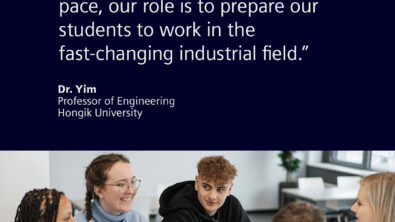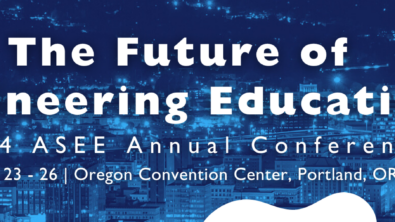Uniting minds and machines at the Academic PLM Days

The Academic PLM Days recently convened its annual forum in Lemgo, Germany this March. More than 50 professors, mainly from universities of applied sciences, met at the campus of OWL University of Applied Sciences to discuss matters concerning the education of future engineers. Organized by the German PLM User Group, this two-day conference is an opportunity for professors to share best practices and to discuss challenges imposed by industry trends. As these professors base their research and curriculum on software from Siemens Digital Industries Software, they were supported by participating experts from this leading supplier.

Professor Christian Glockner from RheinMain University of Applied Sciences and Arts in Wiesbaden and Rüsselsheim opened the conference, followed by Professor Andreas Deuter, the local host, who displayed recorded messages from Professor Dr. Jürgen Krahl, President of OWL University of Applied Sciences, and Karl Hermann Dietz from Siemens Digital Industries Software.
Following these messages, the conference moved into the details of modern engineering education. Professor Eckhard Finke presented the Muenster University of Applied Sciences’ use of NX and Simcenter in their end-to-end engineering training program. He was followed by Nicolas Rolinck of the Rosenheim University of Applied Sciences, who presented the school’s additive manufacturing educational plan. Vocational institutions were represented by Sven Kleinemas of the Bielefeld Carl-Severing-Berufskolleg für Metall- und Elektrotechnik, who spoke on modern professional education in step with actual practice in the context of Industry 4.0.
Creating improved learning environments
As the conference progressed, professors from various institutions presented pathways towards enriched learning environments. Professor Ute Dietrich shared how the HTW Berlin University of Applied Science and Economy has successfully implemented studio-based learning in international projects such as the “Global Women in Engineering” summer school. This is done to enhance sought-after competencies in mathematics, informatics, natural sciences, and technology (MINT), with a strong emphasis on empowering women. Thomas Weidner expanded on the educational concept using Teamcenter throughout bachelor and master courses at the Aalen University of Applied Science and Arts.
In a closer examination of host institution OWL University of Applied Sciences, Jan-Phillip Herrmann presented the teaching and learning concept for Advanced Systems Engineering. Professor Andreas Deuter provided additional depth by exploring the PLM teaching concept utilizing Polarion software, which was covered in this Siemens case study.
Bridging the gap between industry and academia
The Academic PLM Days are also a forum for exchange between academia and business partners. Subject matter experts from Siemens and other supporting industry partners exchanged knowledge about potential solutions to the challenges in education. Lars Kalveram of MAIT Germany presented the vision of using PLM strategies to bridge the gap between education and the industry, while Bengcon UG’s Kelly Schmitt made participants in her workshop aware of the benefits of using Teamcenter in education. Heinrich Flaum and Florian Schneider of JANUS Engineering presented the JANUS TechnologyManager tool management system as a vehicle to better prepare students for their future roles.

As the curtains drew on the Academic PLM Days, attendees departed with a renewed sense of purpose and inspiration. The conference not only provided a platform for knowledge exchange but had also fostered a community dedicated to shaping the future of engineering education. Vivid discussions continued during a feudal dinner in the halls of the palatial Stadtpalais Hotel on the evening of the first day, and those with a cultural as well as technical interest also enjoyed an evening walk through the picturesque medieval town of Lemgo.
The Academic PLM Days will be returning in 2025, but in the meantime visit the Academic and Startups – Siemens Software page to learn more about how Siemens is impacting the future of engineering education.


